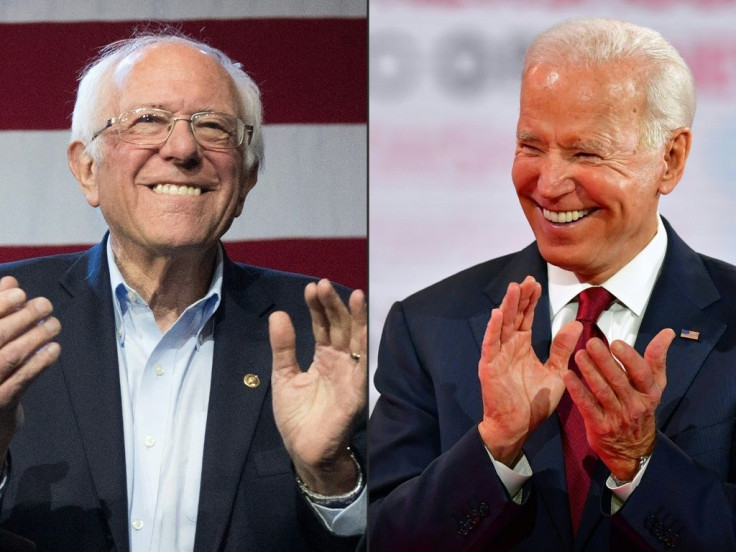Dems Close Ranks As Biden Names AOC And Other Progressives To Policy Task Force

KEY POINTS
- Biden, Sanders announced a joint "task force" to influence DNC policy
- Task force consists of many people who endorsed Biden and Sanders
- Another signal that Biden wants to unify the party
Presumptive Democratic presidential candidate Joe Biden has picked some of the most progressive voices to recommend policy, in a bid to broadbase his supporters and prevent a rerun of the 2016 election in which a trust deficit in the party tilted the balance in favour of Donald Trump. The “unity task force” set up by Biden and primary runner-up Bernie Sanders is co-chaired by multiple progressives who supported Sanders in the primary, including Rep. Alexandria Ocasio-Cortez, D-N.Y.
The task force will make recommendations to the Democratic National Committee on policy changes to the party platform. Ocasio-Cortez will co-chair the climate change initiative with John Kerry, former Democratic Senator and Secretary of State. Biden supporter and Congressional Black Caucus Chair Rep. Karen Bass, D-Calif., will co-chair the economic task force with labor leader Sara Nelson, who supported Sanders in the primary.
The criminal justice reform panel will be co-chaired by Chiraag Bains, who prosecuted police abuse and hate crimes at the Department of Justice, and Rep. Bobby Scott, D-Va., who is the House Chairman of the Committee on Education and Labor. Education will be co-chaired by Rep. Marcia Fudge, D-Ohio, and Dr. Heather Gautney, who was a policy advisor to Sanders’ primary campaign.
Immigration will be headed by the Executive Director of the National Immigration Law Center, Marielena Hincapié, and Rep. Lucille Roybal-Allard, D-Calif., who supported Biden in the primary. Rounding out the six committees, the joint-healthcare task force will be co-chaired by former Surgeon General Vivek Murthy and co-chair of the Congressional Progressive Caucus, Rep. Pramila Jayapal, D-Wash. Varshini Prakash, the founder of the Sunrise Movement who staged the protest outside Nancy Pelosi's office that injected the Green New Deal into the national policy conversation, is also on the climate committee.
This task force represents a fairly dramatic shift from the 2016 primary, where the Hillary Clinton campaign did not reach out to the progressive wing of the party with meaningful policy concessions like this. Whether this task force actually impacts policy remains to be seen, but the message sent by Biden and Sanders is clear: they are trying to unify the party.
At the end of April when rumors of this task force were beginning to swirl, Politico spoke to Rep. Jayapal about Biden’s health care stance, and she said that “I'd be fooling myself if I thought Joe Biden would embrace Medicare for All. But I do think there’s room for him to move much more than he has so far,” summarizing the skeptical but hopeful position many on the left are beginning to adopt.
Rep. Ocasio-Cortez’s spokesman echoed the cautious tone many on the left are taking, saying that “[AOC] made the decision with members of the Climate Justice community - and she will be fully accountable to them and the larger advocacy community during this process. She believes the movement will only be successful if we continue to apply pressure both inside and outside the system.”
These statements from perhaps the two most influential progressives in Congress besides Sanders reflect a growing split on the left. Many are disheartened by Sanders’ primary loss and Biden’s “nothing will fundamentally change” quote to his donors, while others like AOC are adopting the position that Biden’s current policy positions are insufficient but they believe they can push him to the left. Rebecca Katz, founder of New Deal Strategies, also communicated skeptical optimism, saying on Twitter that “This is hopefully a positive sign that Biden is understanding the urgency of climate change, and willing to listen.”
Kate Aronoff, a climate writer for the New Republic and an influential voice in the movement to stop climate change, said that the array of progressives added to this task force “does inspire some much-needed confidence.”
Having @VarshPrakash @AOC @FlyingWithSara @DarrickHamilton @StephanieKelton and @AbdulElSayed in the door figuring out what a Biden administration could look really does inspire some much-needed confidence
— Kate Aronoff (@KateAronoff) May 13, 2020
The 2016 campaign alienated much of the left from the Democratic Party, and it is safe to say that it had a deleterious effect on Clinton’s chances to win. Had she won all the votes in Pennsylvania, Michigan and Wisconsin that went to the Green Party, she would be president right now.
Many progressives are justifiably skeptical of anything Biden says, given his longtime alliance with the Democratic establishment almost no leftist trusts. However, this task force is filled with people trusted by the progressive left, and given the centrality of policy to progressive priorities, they would not have joined if they did not believe that they could influence policy.
This is yet another data point demonstrating that the anger and division that characterized the 2016 Democratic presidential campaign is not following through to 2020, and there is real hope on the left that at least parts of a progressive agenda will be adopted by a potential Biden administration.
© Copyright IBTimes 2025. All rights reserved.




















